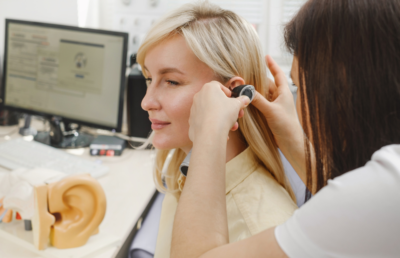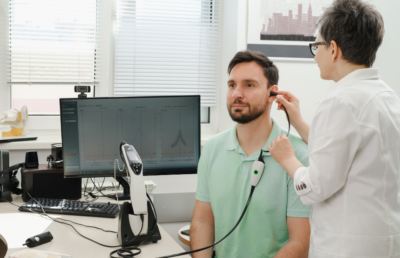By Guest Blogger, Shanna Groves of Lipreadingmom.com
Among them is Mary Butler of Tennessee, a hard of hearing mother of one. Because of the challenges of understanding a child’s delicate voice, Butler said she would think twice before watching other people’s children.
“It is very difficult, if next to impossible, to discern what they are saying,” Butler said. “I’ve met children who became very frustrated with me because they thought I wasn’t paying attention to them. Let’s just say I am happy to baby sit a newborn, but once they reach the age where they start talking, I’ll pass.”
Among the communication difficulties noted by Deborah Wolter and Kathleen Quinn in their article “Young Children in Families with a Parent with Hearing Loss” (Hearing Loss, July/August 1999) are:
- Lack of dialogue between kids and their HOH parents
- HOH adults using older children as interpreters for younger kids
- Failure to hear a child’s night crying and identify its cause
- Tantrums, whining or frustration among children when unable to get the adult’s attention
- Younger kids gesturing, pointing or leading the HOH adult instead of talking
In a perfect world, all children would come with captioning devices attached to them so hard of hearing folks could understand their words. Until that day, these communication and technology strategies may help.
Make Eye Contact
Susan Baird of Ontario has lived with hearing loss since age 13. Her son, who lives at home, also has hearing loss. Because her kids become frustrated with repeating things, she asks them to tap her shoulder and clearly say “Mom” first. She then makes eye contact, and they begin speaking.
“I tell them always to face me when talking, be close to me when talking and talk slowly to me,” Baird said.
If it is an important conversation topic, Baird takes them to a quiet room to talk so that she and the kids can pay attention.
“Sometimes if they don’t do these things, I just don’t answer as I have only heard part of the story,” she said.
Consider Technology and Hearing Dogs
Hearing our children when in another room of the house is challenging if not impossible for HOH adults. In addition to wearing hearing aids or cochlear implants, some parents and grandparents rely on hearing assistive technologies.
To hear her child’s middle-of-the-night cries, Butler initially opted for the AlertMaster wireless notification system, which flashed a connected lamp and shook her bed to alert her. One drawback was that her youngster had to wail loudly for several seconds for the monitor to be activated. She eventually chose a simple Fisher Price Lights and Sounds monitor that features illuminated red dots as the crying intensifies. As a back-up, Butler slept with her hearing aids on. While the hearing aids were uncomfortable to wear while sleeping, she insists that they were crucial in alerting her to her child’s sobs.
Vibrating and strobe-flashing monitors can be programmed to alert a parent or grandparent of noise coming from a child’s room. A video monitor is another option, but only for daytime use as there is no guarantee of it waking up a HOH person in the middle of the night.
A frequency modulated (FM) system can assist with hearing a child in a noisy car or restaurant. The HOH adult attaches a FM system loop to hearing aids, and the child wears a microphone receiver. The child’s voice is transmitted directly to the adult’s aids via the FM system.
For the animal lover, a trained hearing assistance dog may work just as well or better than assistive technology. Denise Portis of Maryland acquired a hearing dog as her kids got older. Canine helper “Chloe” alerts Portis to various sounds and provides balance support due to the Meniere’s Disease Portis has dealt with for five years. “When Chloe is with me, I don’t feel as ‘deaf’ or as ‘helpless,’” Portis shared on her site, HearingElmo.com. “She makes me feel more ‘normal’ in providing things I cannot do for myself.”
Have Fun with Communication
Portis began losing her hearing after the birth of a son. Her daughter was barely a year old. To teach such young children how to communicate with her, Portis devised age-appropriate games.
As toddlers, they played a variation of Peek-a-boo. Portis covered her eyes with her hands and remained quiet. Then she lowered her hands, made eye contact and spoke to them. “If they grew impatient and said something while I was ‘covered,’ I’d say, ‘Oh… What? Wait I can’t see you. I can’t hear you!’” Portis said. “They soon learned to mimic me and would be very quiet and serious when their chubby little baby hands covering their eyes. Then they’d ‘pop’ out and laugh and say, ‘I see you… I see you.’”
The “Guess What? Face” game became popular as the kids grew older. Portis would run over to them and in an excited voice say, “I’ve got my Guess What? Face on!” Then, kneeling at eye level and with her hands on their cheeks, she would tell them something.
Turn Noises Off
Sometimes a parent or grandparent with hearing loss needs a hearing rest. Whether it is a nap or a few minutes of quiet time, we should encourage children to accommodate us in our need for minimal noise.
Russell Barr’s hearing loss is selective. He can understand most men’s voices, but he struggles to hear children. When his granddaughter visited, the TV was turned off and other background noise was reduced. “This translates into more immediate and intimate time with her. And in overcompensating, I actually pay more attention to her,” said Barr. “Who doesn’t like to be the center of the universe even for a couple of minutes?”
One part of the day can be declared “Take My Ears Out” time. Portis let her kids know when her hearing aids or cochlear implant was taken out, and they would have to write her a note if they wanted to discuss something. “Now that we have our own computers,” Portis said, “they often IM me during the day even though they are only downstairs. I’ve even received text messages from my son who prefers not having to come find me!”
Educate Your Child
As our children grow, there is much we can teach them about hearing loss. Besides facing us when they talk, kids should be educated about good speech habits, such as enunciating words, speaking slowly, and standing no more than a few feet away when talking to an adult with hearing loss.
When Eric Wright, who has hearing loss, doesn’t catch what his daughter says even though she is facing him, he asks her to speak clearly into his hearing aided ear. “I have lost those pitches that include small children’s voices,” he said. “I also have a hard time when people are talking fast because they are excited. I have to ask people to slow down sometimes.”
Other helpful tips for parents and grandparents with hearing loss:
- Encourage your children to speak clearly by teaching them proper word pronunciation. Emphasize each vowel and consonant sound, particularly the “softer” consonant sounds of “t,” “s” “f” and “v.”
- Ask the child to turn off any toys or music before speaking, since both create background noise.
- When your kids are in the backseat while you are driving a car, ask them to wait until you are at a stoplight to communicate with you, if at all possible. Try not to respond to comments from children unless the car is stopped. The FM hearing device (mentioned above) may help with hearing their voices.
- In other situations, respond to a child’s question or comment only if he or she is facing you. Eventually, the child will understand the importance of eye contact in communicating with a HOH person.
- If you don’t understand what a child said, resist the urge to pretend you did. Instead say, “My ears didn’t hear you. Please tell me again.”
(c) Copyright LipreadingMom.com




